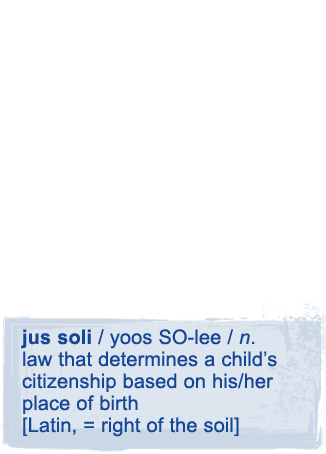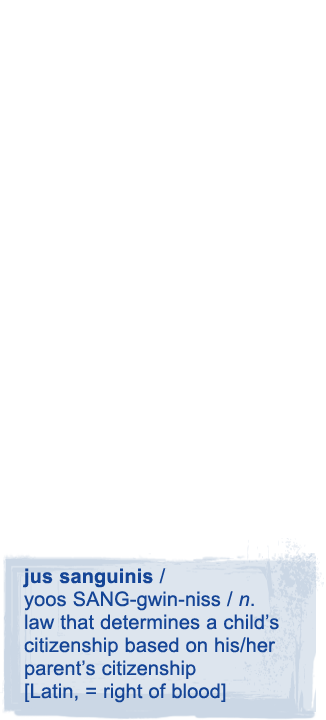

Belonging is important. Everyone deserves a home—whether it’s as small
as a family or as big as a country. In fact, citizenship in a country is a human
right. As an adult citizen, you are a full and equal member of the state. You
have certain rights, such as protection under the law, and certain responsibilities, such as paying taxes and obeying the law.
Gaining Citizenship
There are three basic ways to gain citizenship.

1. Jus soli
One way to become a citizen of a country is simply to be born there. This is known as citizenship jus soli, or birthright citizenship. Approximately 16 percent of countries around the world grant citizenship based on the rule of jus soli. They include:
| Canada | Brazil |
| United States | Pakistan |
| Australia | Mexico |
Countries in which this law does not apply include Italy, Japan, and Switzerland.
2. Jus sanguinisCitizenship jus sanguinis, or bloodline citizenship, is another way to gain a nationality. Under this rule, you inherit the citizenship of one of your parents, grandparents, or other direct ancestors. Examples of countries that adhere to this law include:
| Canada | France |
| United States | Germany |
| Japan | Italy |
As you can see, some countries adhere to the laws of both jus soli and jus sanguinis. And every country has further rules and exceptions: for example, if you are born in Canada to a parent who is a diplomat from another country, the rule of jus soli does not apply.
3. Naturalization
If you want to become a citizen of a country but were neither born there nor have a familial entitlement to citizenship, you can go through a legal process called naturalization. You might have to live in the country for a specific amount of time, be of a particular age, understand the country’s language and government system, and complete a test to verify your knowledge as part of a rigorous application process.
While most countries grant citizenship based on some combination of these three principles (jus soli, jus sanguinis, and naturalization), many countries have other ways that you can become a citizen. You can marry a citizen, for example: but this method can lead to marriages of convenience. Preventing such abuses is undoubtedly one reason Canada does not allow automatic citizenship through marriage.
Why Be a Citizen?
Most countries allow you to live and even work there without being a citizen. There may be time limits and restrictions on when or how often you can leave or return. But otherwise, provided human rights are valued and maintained and you can socialize as you please, you can live a full, meaningful life without being a citizen. For example:
- Permanent Residents in Canada are not citizens, but they can live and work without restriction. They can even come and go as they please, provided they live two years out of every five in Canada. But they cannot vote in any elections, from municipal to federal, or run for elected office.
- American Samoa is a self-governing territory that belongs to the United States. People born there hold US passports stamped with the classification US National and are free to live and work in the US without restriction. But they cannot vote in US national elections.


